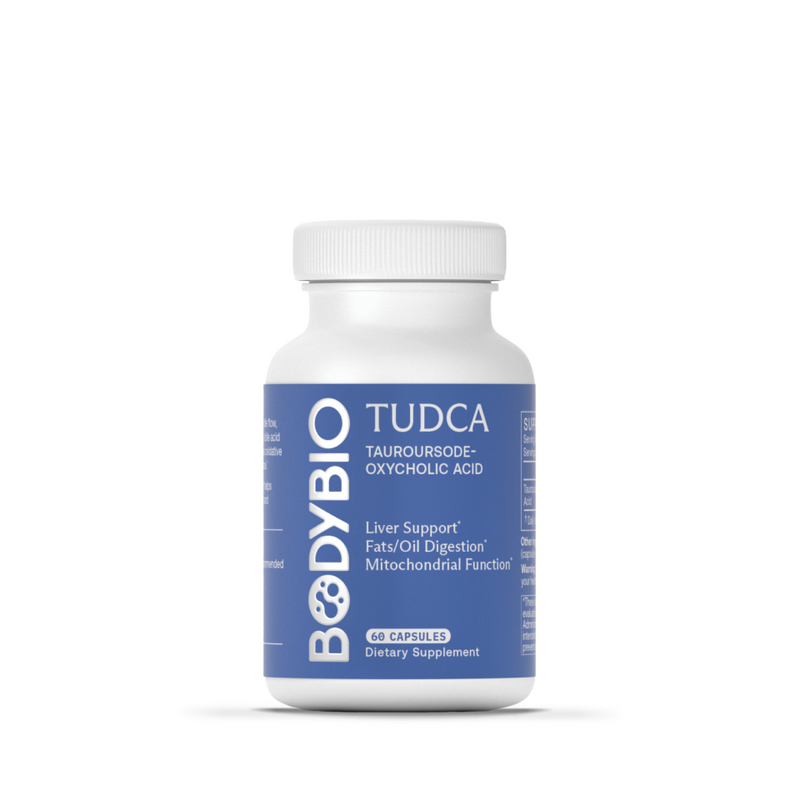Gallbladder Health 101: What It Does and How to Keep It Working Well
Authors:

Ashley Palmer
Nutritional Therapy Practitioner, Health & Wellness Expert
Key Takeaways:
The gallbladder may not get much attention compared to the gut, but it plays a central role in digestion, detoxification, and helping your body absorb nutrients. The gallbladder is best known for storing and releasing bile (a substance your liver produces to break down fats). Bile doesn’t just help with digestion—it’s also critical for clearing excess hormones and toxins from the body. And yet, the gallbladder is often overlooked until symptoms become disruptive enough to land you in a doctor’s office.
A well-functioning gallbladder keeps digestion moving smoothly and helps your body keep up with everyday metabolic demands. But when your bile gets too thick or sluggish (bile that isn’t flowing properly or efficiently), it can slow the whole digestion process down, from how you absorb nutrients to how you eliminate waste.
Let’s deep dive into gallbladder health and what you can do to support it.
Table of Contents:
-
Your Gallbladder Does More Than You Think
-
Signs Your Gallbladder May Be Struggling
-
Gallbladder Health Starts With the Right Daily Habits
-
Food & Nutrients That Support Bile Flow and Gallbladder Function
-
Smart Supplementation: Strengthening Gallbladder Function
-
Give Your Gallbladder What It Really Needs
Your Gallbladder Does More Than You Think
Most people don’t think twice about their gallbladder until something goes wrong. But this little organ plays a big role in digestion: it stores and releases bile (a substance made by your liver to help break down healthy fats), eliminates toxins, and absorbs fat-soluble nutrients.
Gallbladder issues aren’t always obvious. You might notice bloating or discomfort after meals, an intolerance to fatty foods, or nausea that’s hard to pin down to a specific cause. These signs are often dismissed but may point to sluggish bile flow.
When bile becomes too thick or even stagnant, everything slows down—nutrient absorption, toxin elimination, and even waste removal. Maintaining healthy bile flow is essential to keep these systems moving efficiently. Over time, stagnant bile may also increase the risk of gallstone formation (a buildup of cholesterol or bilirubin that hardens in the gallbladder).
While not everyone with gallstones experiences symptoms, supporting healthy bile flow through diet, hydration, and movement can help reduce that risk and keep digestion on track and stones to a minimum. For people without a gallbladder (post-cholecystectomy), bile can still become imbalanced, which makes ongoing support just as important.
Signs Your Gallbladder May Be Struggling
Not everyone with gallbladder issues experiences dramatic symptoms. Many signs are easy to overlook or misattribute to other conditions. Even if tests appear normal, some functional issues can still be present.
Here are a few to watch for:
-
Discomfort or bloating after eating, especially after high-fat meals
-
Pale or clay-colored stools (a sign of bile salt malabsorption)
-
Nausea or indigestion
-
A feeling of fullness or pressure under the right ribcage
-
Floating stools or greasy-looking bowel movements
-
Unexplained fatigue or headaches
Gallbladder Health Starts With the Right Daily Habits
Small daily habits can make a big difference in gallbladder function, even if you don’t have a diagnosis. Your liver and gallbladder respond to routine. How you eat, move, hydrate, and manage stress directly affects how bile is made and how it moves through your gallbladder.
The goal is to create conditions that encourage steady bile flow without adding stress to your digestive system. That means staying hydrated, eating nourishing fats with meals to naturally signal bile release, and keeping a consistent eating schedule. Morning lemon water or digestive bitters before meals can also help activate bile flow without being too aggressive on your stomach.
Daily Habits to Help Support Bile Flow Naturally
Small daily habits can go a long way in helping you digest fats more effectively and support long-term gut and gallbladder health. These habits also help prevent bile stagnation, which is one of the most effective ways to reduce long-term gallstone risk.
-
Stay well hydrated. Water keeps bile from becoming too thick or concentrated.
-
Incorporate healthy fats. Moderate amounts of good fats signal the gallbladder to release bile.
-
Avoid long fasting periods. Eating at regular intervals of 3-4 hours keeps bile moving.
-
Move your body. Light movement, like walking, supports liver and gallbladder function.
-
Manage stress. Chronic stress can reduce bile secretion and impair digestion.
-
Supplementation: Consider adding TUDCA (tauroursodeoxycholic acid) and phosphatidylcholine (PC) with meals to support bile composition and gallbladder tone (the strength and responsiveness of the gallbladder’s muscular contractions).*
What to Avoid for Gallbladder Stress
Certain habits can seem healthy on the surface, but they may disrupt bile flow and strain the gallbladder. Very low-fat diets can limit bile stimulation, while meal skipping or extended fasting allows bile to thicken.
Common triggers that strain the gallbladder include:
-
Low-fat or fat-free diets
-
Processed or deep-fried foods
-
Skipping meals
-
Rapid weight loss or crash dieting
-
Chronic dehydration
Food & Nutrients That Support Bile Flow and Gallbladder Function
What you eat directly influences the quality and movement of your bile.
Foods and nutrients that nourish bile production and gallbladder tone:
-
Healthy fats release and aid fat digestion.
-
Bitter vegetables promote bile production and flow.
-
Choline-rich foods support bile formation and liver detox pathways.
-
Magnesium-rich foods help keep bile smooth and prevent stagnation.
-
Taurine-containing foods help your body process bile acids so they can be used effectively.
|
Foods That Naturally Signal Bile Release |
Benefits |
|
Olive Oil |
Triggers bile release and improves fat digestion |
|
Avocado |
Rich in healthy fats to stimulate bile flow |
|
Fatty Fish (e.g., salmon, sardines) |
High in omega-3s for anti-inflammatory support |
|
Egg Yolks |
High in choline, essential for bile production |
|
Coconut Oil |
Medium-chain fats that are easier to digest |
|
Bitter Vegetables (e.g., dandelion greens, radicchio, mustard greens) |
Stimulate bile production and liver activity |
|
Magnesium-Rich Foods (e.g., spinach, pumpkin seeds, black beans) |
Support the muscle tone of the gallbladder to encourage proper bile release |
|
Nuts and Seeds (moderate portion) |
Provide essential fatty acids |
|
Grass-fed Butter |
Contains fat-soluble vitamins that support bile |
|
Foods Containing Taurine (e.g., shellfish, dark meat poultry) |
Help process bile acids for effective fat digestion |
Smart Supplementation: Strengthening Gallbladder Function
Even with a nutrient-rich diet, targeted supplementation can offer additional support for the gallbladder, especially when dealing with sluggish bile or post-cholecystectomy bile flow.
-
TUDCA helps maintain bile flow and composition, supporting digestion and reducing bile stagnation—key benefits tied to the balance of bile salts, phospholipids, cholesterol, and other compounds that make up healthy bile.*
-
Phosphatidylcholine (PC) supports bile structure and helps emulsify fats, making digestion more efficient while supporting liver health and detoxification.*
-
Digestive bitters and enzymes can enhance bile production and improve nutrient absorption when taken before meals, especially when used alongside TUDCA and ox bile for targeted support.*
If you're struggling with symptoms like bloating after meals, pale stools, or difficulty digesting fats, these additions may help restore bile rhythm and support long-term digestive health.*
Give Your Gallbladder What It Really Needs
Too often, people are told to avoid fats when facing gallbladder symptoms, but the real key is encouraging healthy bile flow, not starving it. The gallbladder relies on regular, nourishing signals to keep digestion running smoothly.
Gallbladder health may not always be top of mind, but small, daily choices can have a big impact. Staying hydrated, choosing high-quality fats, and incorporating bile-supportive nutrients are simple steps that can help ease digestion and support long-term wellness.

